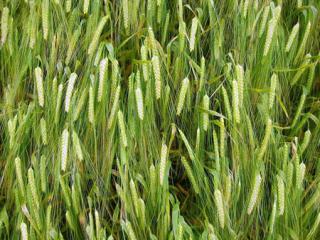Latest Briefing in Climate, water and energy

Integrated Disease Management in Spring Barley
Intergrated Disease Management (IDM) could help greatly reduce the volume of crops lost to disease in Scotland, contributing to our future food security. It works by integrating plant resistance, fungicides, cultural methods such as appropriate use of fertilisers, and newer, innovative approaches, to provide effective and sustainable disease control.
In Scotland, barley is the second most important crop after grass, with nearly 300,000 ha grown in 2012, with a net value of £315 million. Diseases represent a major constraint to barley production globally, despite considerable effort to control the pathogens responsible. The ability of pathogens to overcome host resistance, development of pathogen insensitivity to fungicides, and the increasing importance of pathogens thought previously to be of minor significance, means that diseases will continue to pose a threat to global barley production.
These constraints, coupled with increasing legislation aimed at protecting the environment, have led to increased efforts to find more sustainable approaches to disease control. Such approaches clearly need to balance protecting the crop from threats such as diseases, pests and weeds, with the need to minimise environmental damage, and requires an integrated approach to crop protection.
IDM represents such an approach and is a continuously improving process in which innovative solutions are integrated and adapted locally by growers. By offering a broad spectrum, integrated approach to disease control, IDM will contribute to reducing reliance on pesticides in agricultural systems.
Read morePublished on 16 December 2014 in Climate, water and energy , Ecosystems and biodiversity , Food, health and wellbeing
Recent Briefings in Climate, water and energy
Ruminants And Methane
This science brief describes two strategies that have been effective to differing degrees in the reduction of methane production from ruminants. Read more
Published on 5 February 2010 in Climate, water and energy
Applying New Diagnostics To Potato Cyst Nematodes
Workers at SCRI and SASA have teamed up to develop an improved molecular diagnostic for potato cyst nematodes (PCN) using the latest technology. Read more
Published on 6 January 2010 in Sustainability and Communities , Climate, water and energy
Differential Social Impacts Of Climate Change In The UK
An investigation into the social impacts of climate change . Read more
Published on 23 November 2009 in Climate, water and energy , Food, health and wellbeing
Sustainability-Plant Disease Control
A major way to contribute to increased crop production is by improving control of pests and diseases through better surveillance, optimising chemical inputs and developing resistant crops. Read more
Published on 17 November 2009 in Sustainability and Communities , Climate, water and energy
Parasites And Climate Change - Implications For Scottish livestock?
Research into how climate change could be affecting the epidemiology of liver fluke and other parasitic worms in livestock. Read more
Published on 15 May 2009 in Sustainability and Communities , Climate, water and energy , Food, health and wellbeing
Climate Change And Land Capability For Agriculture (LCA)
The Macaulay Land Capability for Agriculture (LCA) system is widely used by planners, land managers and increasingly by policy makers in Scotland. Read more
Published on 16 April 2009 in Climate, water and energy
Climate Change Scenarios and Issues for Crops in Scotland
Published on 27 January 2009 in Climate, water and energy
Determining Cost-Effective Climate Change Activity In Agriculture, Land Use And Forestry
Published on 8 January 2009 in Climate, water and energy







